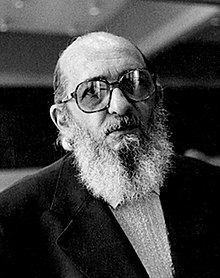Freire, Paulo

Bio: (1921-1997) Brazilian educator and philosopher. Paulo Freire studied law at the University of Recife, and after that, he worked as a teacher. In 1946, Freire was appointed director of the Pernambuco Department of Education and Culture, and in 1961, he was appointed director of the Department of Cultural Extension at the University of Recife. After the military coup in Brazil in 1964 he was exiled to Chile, and in 1979 he become a visiting professor at Harvard University. After a short stay in the USA, he moved to Switzerland and in 1980 returned to Brazil.
Freire revolutionized the field of education, using his theoretical and practical approach of critical pedagogy. His most famous book is Pedagogy of the Oppressed (1970) where he elaborated his approach. His goal was to create politically engaged pedagogy against the prevailing “culture of silence”, which refers to the conditions of life and work of the poor and illiterate Brazilian working class. The goal of critical pedagogy was to empower marginalized and oppressed communities through education. He believed that education should not be a tool of domination but rather a means of liberation. According to Freire, traditional education systems, which he called the “banking approach” to education, were designed to maintain the status quo, reproduce existing power structures, and maintain the oppression of the marginalized. He called for a radical reimagining of education that would challenge these power structures and allow for the liberation of the oppressed.
Freire's most famous concept is that of "conscientization." This term refers to the process by which individuals become aware of their own oppression and develop the critical consciousness necessary to challenge it. He argued that the education system should focus on developing critical consciousness, rather than simply imparting knowledge. He called this model ”dialogic learning” and it involved creating a dialogue between students and teachers, where both parties learn from each other and engage in critical reflection on their experiences.
Another important aspect of Freire's work is his emphasis on praxis, which refers to the integration of theory and practice. He believed that education should not be an abstract, intellectual exercise but rather a practical one that involves engaging with the world and making concrete changes. The conditions of oppression and domination were obscured by the ruling classes, so the goal of Praxis was to direct collective action to transform the world and reflect on that action in order to refine one's understanding of the world and one's place in it.
Freire's work has had a profound impact on the field of education, particularly in the areas of critical pedagogy and adult education. His ideas have been used to develop educational programs that empower marginalized communities, including the poor, women, and racial minorities.
Main works
Cultural Action for Freedom (1970);
Pedagogy of the Oppressed (1970);
Education: The Practice of Freedom (1974);
Pedagogy of the Heart (1997).

